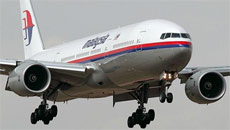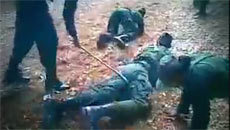The death of 13 Sherpas and the disappearance of three more in an avalanche on Mount Everest has brought into sharp focus the danger faced by these guides who make climbing the highest mountain in the world possible.
"Without the Sherpas, very few people would scale the Everest. Without them commercial expeditions would disappear," Elizabeth Hawley, keeper of Himalayan mountain climbing records, told EFE, the Spanish news agency.
Commercial expeditions to the mountains in Nepal began in the 1990s and every spring brings hundreds of climbers from around the world with the dream of scaling the Everest.
The Sherpas, the ethnic group living at the foot of the Nepalese mountains, are preferred by the foreigners for the Himalayan expeditions due to their physical strength, perfectly suited to heights, as well as for their honesty.
"Tibetans also serve as guides but the climbers prefer the Sherpas," Hawley explained.
When New Zealander Edmund Hillary climbed Mount Everest in 1953 he didn't go alone; Tenzing Norgay, a Sherpa, made the ascent together with him.
Sherpas do the toughest job at a height of 8,848 m: opening the way for the climbers, placing the climbing ropes and carrying the tents, food and oxygen pumps.
In the climbing circles, it is said that if you have enough money, a Sherpa will carry you to the top of the mountain.

Following the fatal avalanche last April 18 that occurred at an altitude of 5,900 m at the treacherous Khumbu icefall, around 50 Sherpas climbed till the campsite II with oxygen cylinders, food and sleeping bags that would be used by their foreign customers later.
"It was basically a mobile hotel," said Jiban Ghimire of Shangri-la Nepal Treks, which lost five Sherpas in the avalanche.
Each mountaineer pays between $35,000 and $90,000 to the companies that organise the expeditions out of which around $5,000 are paid to the Sherpas in a country where the yearly average per capita income is $500.
The Sherpas are well aware of the risks.
"This is our job. There are always risks", Lakpa Sherpa, who lost a cousin in the avalanche, told EFE.
Nonetheless, the worst ever tragedy in terms of the number of deaths has deeply affected the Sherpa community, which has decided to suspend expeditions for a week as a mark of respect for their colleagues.
Since then, six out of the 31 scheduled expeditions have been cancelled for this season and the future of the remaining ones is unclear due to the Sherpas' refusal to continue.
The Sherpas have been asking Nepal's authorities for improvements in working conditions such as better medical insurance and the creation of a fund for the guides who die in accidents.
After the avalanche, the government announced a compensation of about $400 for the families of the victims and increased the life insurance of Sherpas to $15,000, but the Sherpas are demanding that the amount be increased to $20,000.

The guides are aware that the Everest provides them with employment and a better quality of life than many of their fellow citizens.
But they seek a larger share in the industry in which they are the ones risking their lives.
"Without mountaineering our standard of living would not be what it is," stated Ang Tshering Sherpa, owner of Asian Trekking, one of the largest trekking companies in Nepal.




